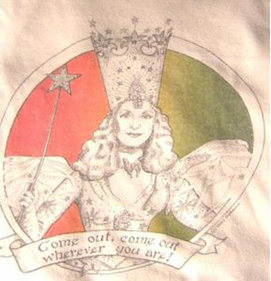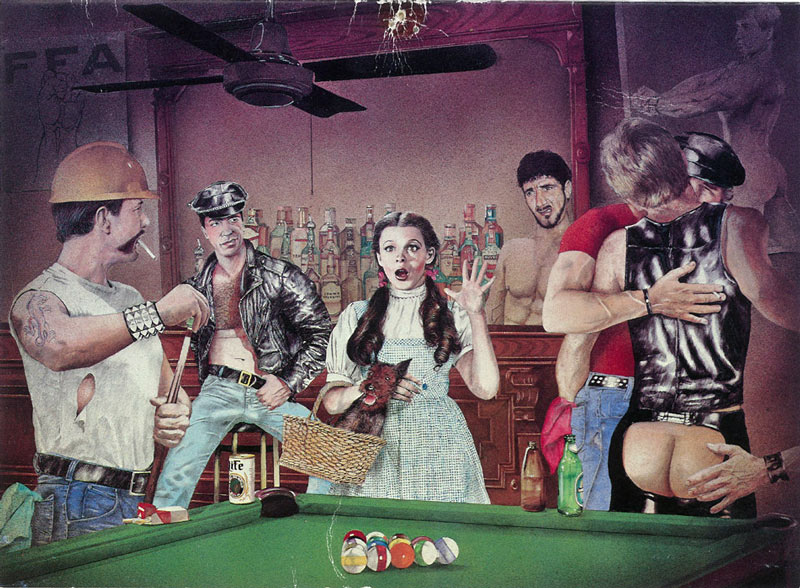THE OZ-GAY CONNECTION
|
“When I was a little kid my favourite [sic] outfit was this little apron that I used to dance around in, pretending to be Dorothy, with a little lamb called Toto. I was like, ‘Let’s go to Oz!’ … On good days I was Dorothy, on bad days I was the Wicked Witch.” — Rufus Wainwright, gay singer and composer.
“When I was a child, I used to get the neighborhood kids together, and we would do a reenactment of the movie the day after it was on television … I always had to play the Scarecrow, because obviously I couldn’t be Dorothy.”
—Gregory Maguire, gay author of Wicked: The Life and Times of the Wicked Witch of the West.
“The seeds of why I do what I do are in my childhood. I wouldn’t let Nana of Never-Never Land and Oz go. … Why would I love these wonderlands? They were the ways I best understood myself.”
— Clive Barker, gay writer and film-maker.
|
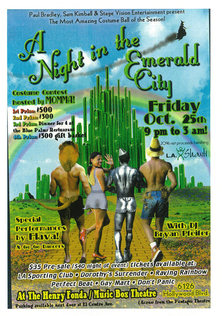
The connection between gay men and The Wizard of Oz is widely acknowledged. For example, Ben Brantley of the New York Times called Oz “a cornerstone in gay mythology.” The view that gay men love The Wizard of Oz is so prevalent, in fact, that it has become part of the received wisdom about homosexuals, and even the gay congressman Barney Frank found occasion to refer to the Oz–gay connection on the floor of the House of Representatives. The stereotype is used to humorous effect in mainstream venues also, such as in a 1996 Hollywood movie, My Fellow Americans, where an “All Dorothy Marching Band” appears in a gay pride parade.
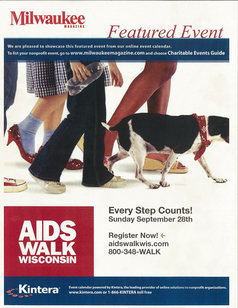
Gay bars and dance clubs, long a focal point of gay communities, frequently use Oz in their names (bars and clubs are called Oz in Seattle; New Orleans; Wausau, Wisconsin; Fort Lauderdale; and Toronto). Other gay-oriented businesses use Oz terminology in their names as well (Oz Creations is a gay gift business in Springfield, Massachusetts). Businesses using the name Dorothy or Toto abound (Dorothy’s Surrender was a gay souvenir store in West Hollywood, California and Toto’s Revenge is a gay gift shop in Long Beach, California). Nonprofit organizations and services also allude to Oz in their names (Surrender Dorothy is an investment group organized by gay men in Chicago). And gay organizations often hold Oz-themed events (“A Night in the Emerald City” was a costume ball to benefit L.A. Shanti, an AIDS group, in 2002).
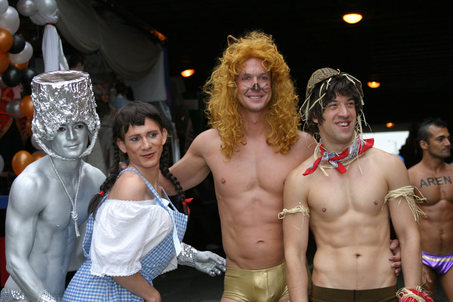
Oz imagery and nomenclature also show up in gay marketing (AIDS Walk Wisconsin has used ruby slippers in its publicity materials for years). Oz imagery is frequently seen in LGBT pride parades, with individuals dressing as characters, floats using Oz as a unifying theme, and organizers choosing Oz for the theme of the parade as a whole (the 2003 Europride Parade, held in Manchester, England, included gay men dressed as characters from The Wizard of Oz). Some campy merchandise created with the gay market in mind plays with Oz imagery (Dorothy’s Surrender in West Hollywood carried a T-shirt with an image of Glinda and the legend “Come out, come out, wherever you are.”).
|
So what’s the story with gay men and The Wizard of Oz? It’s not just the appeal of Judy Garland or the spell of movie magic, since other versions of the Oz story can affect gay men in much the same way as the 1939 MGM movie. Greg Louganis, for example, sang “Believe in Yourself ” from the Broadway musical The Wiz to himself during his Olympic medal-winning diving. The Oz books inspired the English author and visual artist Clive Barker when he was a child. Indeed, gay love for Oz often starts early. One gay man told me that as a three-year-old he was “totally infatuated” with the MGM film. Some gay boys read L. Frank Baum’s original Oz story; others watch the movie version of The Wiz over and over again. |
TOTO, I DON'T THINK WE'RE IN KANSAS ANYMORE!

